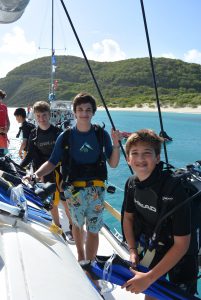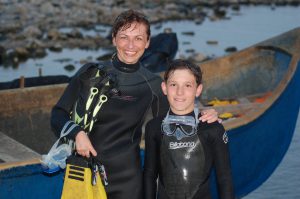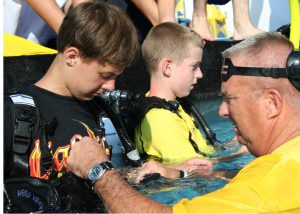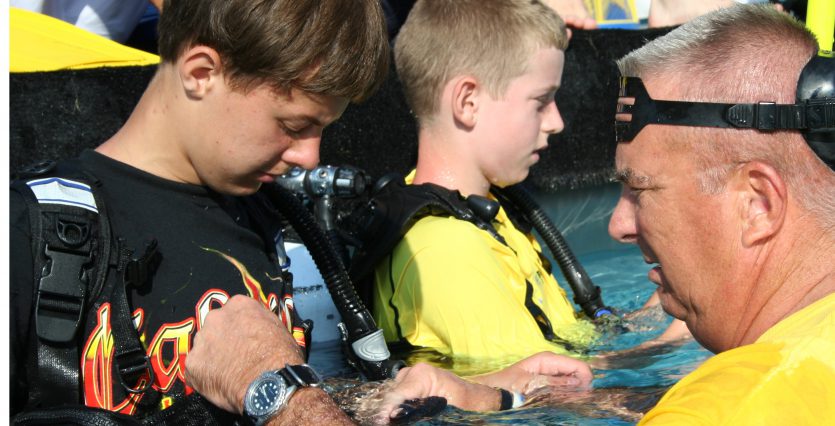
One of the most controversial topics that rear its head when the subject of family diving is discussed is when, or even if, children should be allowed to scuba dive. Of course, no real research has been done on how diving affects the physiologies of young people, but you will never find yourself short on opinions once the topic has been raised. Ultimately, the choice resides with the parents and, of course, the scuba instructor. Like many in the field, instructors themselves diverge wildly on personal opinion as to whether or not young people belong in the water. Regardless of the current industry positions or standards, instructors must decide for themselves how children fit into their individual instructional plans.
Like most scuba diving parents out there, I was thrilled when my children showed an interest in learning about the activity that has shaped my life and enables me to make a living. When they then asked if they could give it a try, I was in heaven. Both of my kids’ first underwater breathing experiences will be forever etched in my mind. Watching the incredible people you are raising embrace the wonders of the underwater world for the first time is indeed a powerful experience.
As with any type of diving, diving with young people has its own subtleties and nuances that govern how it is accomplished. Since the first 4-year-old and 7-year-old divers (Philippe and Jean-Michel Cousteau) ventured in the Mediterranean Sea in 1945, the diving world has been constantly struggling with how, when and where these miniature humans should join the rest of the diving world.
As you would expect from me, I would always default to safety, safety, safety. Nothing in, above or around the sea is worth causing the slightest harm to our children. However, if they are able to understand and apply the concepts and skill required of all divers, then with responsible adult supervision, they should be able to enjoy scuba diving responsibly within predetermined limits. Herein, of course, lies the rub: No two adults, much fewer children are created equal.
David Wakely in DAN’s Alert Diver (Fall 2015) had this to say when discussing important characteristics of the child diver candidates:
- Psychological maturity: Candidates should be calm and rational, not prone to extreme emotional outbursts and not prone to anxiety in unfamiliar situations. They need to understand risk and risk avoidance.
- Educational maturity: The child should be able to learn independently. Learning scuba theory is a big undertaking, and the students must be able to concentrate on the material and know when to ask questions. They should be able to understand what they are reading enough to apply the principles described to situations they see around them in daily life.
- Physical maturity: The child should be able to swim and should be very comfortable in and around water. Currently dive equipment for very small children is hard to find, so the child should be physically large enough to wear the available gear correctly and safely.
- Desire to dive: The desire to dive must come from the child, not the parent. A dad asking an instructor to teach his son is very different from a child who wants to learn to dive like his dad.
- Medically fit: Asthma, ADHD and morbid obesity are prevalent today, and these three conditions commonly disqualify children from diving. If you are considering arranging for your child to learn to dive, discuss your plans with a doctor familiar with dive medicine.
And what of the perspective of the young divers themselves? When interviewed, this 12-year-old NAUI Junior Advanced Open Water Diver / Nitrox Diver had this to say about scuba training and offered these tips to other potential divers of his age group:
- Understand the danger involved.
- Be familiar with and physically capable of handling the equipment.
- Be adult enough to admit when a situation becomes uncomfortable; it’s supposed to be fun, not scary.
- Thermal is a big issue for smaller people.
- Make sure it is something that you want to do, rather than it becoming a chore.
- Remember that most of the time in an emergency, you may have to rescue someone far larger than yourself.
An even younger diver mentioned these things as important to her:
- Learning to scuba dive makes it easier to see the underwater world without having to hold your breath.
- It is neat to see the ocean animals where they really live rather than in an aquarium.
- Remember it’s OK to go very slow when learning to dive. You have the rest of your life to scuba dive, so don’t dive any longer than you want to.
- Look forward to a lifetime of diving, a very fun journey.
The take away here is to remember that our children are just that — children. Let’s make sure we don’t fall into the trap of approaching them as miniature adults. For me, the experience has been the amazing opportunity to ensure that my kids’ first experiences underwater were once-in-a-lifetime, positive experiences rather than a forced or rushed experience resulting in a lifetime of fear or disappointment.


